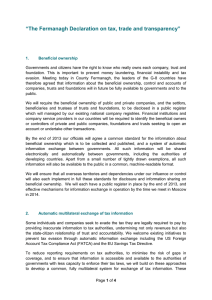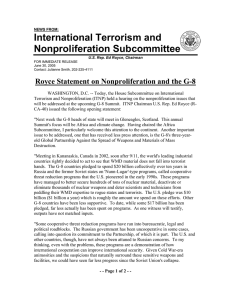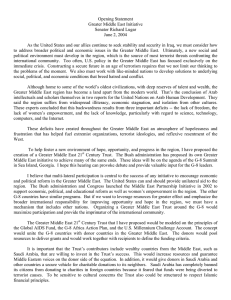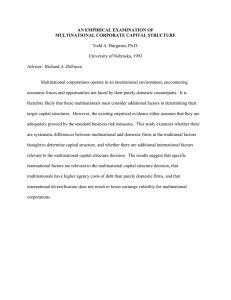“The Fermanagh Declaration on tax, trade and transparency”
advertisement
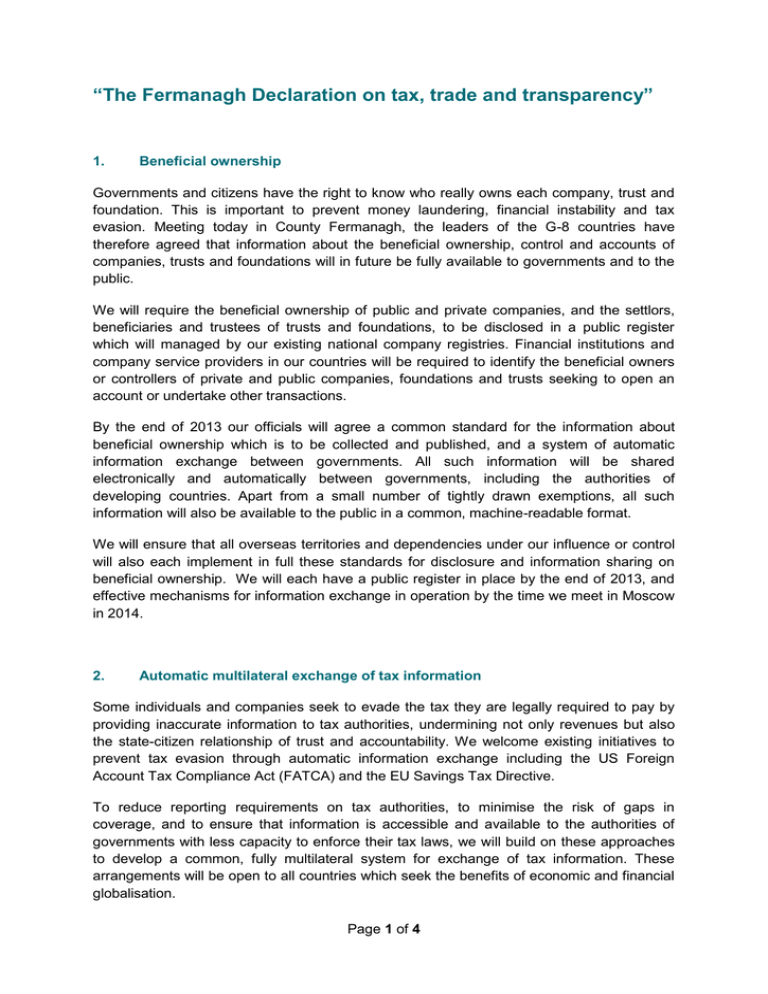
“The Fermanagh Declaration on tax, trade and transparency” 1. Beneficial ownership Governments and citizens have the right to know who really owns each company, trust and foundation. This is important to prevent money laundering, financial instability and tax evasion. Meeting today in County Fermanagh, the leaders of the G-8 countries have therefore agreed that information about the beneficial ownership, control and accounts of companies, trusts and foundations will in future be fully available to governments and to the public. We will require the beneficial ownership of public and private companies, and the settlors, beneficiaries and trustees of trusts and foundations, to be disclosed in a public register which will managed by our existing national company registries. Financial institutions and company service providers in our countries will be required to identify the beneficial owners or controllers of private and public companies, foundations and trusts seeking to open an account or undertake other transactions. By the end of 2013 our officials will agree a common standard for the information about beneficial ownership which is to be collected and published, and a system of automatic information exchange between governments. All such information will be shared electronically and automatically between governments, including the authorities of developing countries. Apart from a small number of tightly drawn exemptions, all such information will also be available to the public in a common, machine-readable format. We will ensure that all overseas territories and dependencies under our influence or control will also each implement in full these standards for disclosure and information sharing on beneficial ownership. We will each have a public register in place by the end of 2013, and effective mechanisms for information exchange in operation by the time we meet in Moscow in 2014. 2. Automatic multilateral exchange of tax information Some individuals and companies seek to evade the tax they are legally required to pay by providing inaccurate information to tax authorities, undermining not only revenues but also the state-citizen relationship of trust and accountability. We welcome existing initiatives to prevent tax evasion through automatic information exchange including the US Foreign Account Tax Compliance Act (FATCA) and the EU Savings Tax Directive. To reduce reporting requirements on tax authorities, to minimise the risk of gaps in coverage, and to ensure that information is accessible and available to the authorities of governments with less capacity to enforce their tax laws, we will build on these approaches to develop a common, fully multilateral system for exchange of tax information. These arrangements will be open to all countries which seek the benefits of economic and financial globalisation. Page 1 of 4 As a first step towards this, we will agree by the end of 2013 a single, common system for automatic exchange of tax information between G-8 countries, which will be implemented by the time of our next meeting in Moscow in 2014. In addition we will discuss with the European Union, G-20 working groups and the UN Committee of Experts on International Cooperation in Tax Matters how this system can be adapted and extended as the foundation of a global system for automatic exchange of tax information between all countries who wish to participate in it. We will ensure that all dependencies and overseas territories under our jurisdiction will comply in full with these systems for exchange of tax information. As well as existing information from individuals and companies, all participating authorities will collect data from financial institutions and companies about income, gains, and property paid to non-resident individuals, corporations, and trusts, which they will provide automatically to the jurisdiction in which that individual or company is resident. We attach particular priority to ensuring that developing countries are able to access and use this information to enable them to collect taxes which are legally due from companies and individuals within their jurisdiction. The authorities of developing countries will be able to access the information shared by our tax authorities from the outset, even if their own tax authorities are not yet themselves in a position to share information automatically. [It is also important that multinational companies should be confident that when they pay tax which is properly due in a developing country, they will not be subject to double taxation in other jurisdictions. Only some G-8 countries have arrangements for giving credit for tax paid in other countries, and these arrangements are inconsistently and unpredictably applied, which may distort and or discourage international investment in developing countries. As confidence grows in the mechanisms for reliably sharing information across jurisdictions and preventing profit-shifting, we will review our tax laws and ensure that multinational companies can be confident of being given appropriate credit for the taxes they pay to less developed countries.] 3. Improved financial reporting of multinational companies The current arrangements for determining how much of a company’s economic activities should be subject to tax in each country are no longer fit for purpose. For the purposes of tax, we mostly treat complex international groups of companies as if they were a set of distinct international businesses, instead of as a single integrated business with operations in many countries. As a result, companies can in practice exercise considerable discretion over how to allocate their profits across different jurisdiction, unrelated to the reality of their business. This “profit shifting” makes it difficult in practice for governments to set and enforce the level of company taxes they deem appropriate. To prevent profit shifting and tax evasion, governments need more information about the overall economic and financial position of multinational companies, and not just the position of arbitrarily drawn legal subsidiaries. We therefore endorse the principle of transparent combined reporting of multinational companies. We look forward to the OECD Action Plan on profit shifting which is being prepared for our meeting in 2014, and we call upon the Page 2 of 4 OECD to work with governments, the private sector and civil society to agree - in time for inclusion in that report - detailed, practical proposals for combined reporting by multinationals. In the meantime, we will immediately require that all multinational company groups registered in our jurisdictions, including in our overseas territories and dependencies, report sales, assets, employment numbers and costs, profits, and taxes paid in each jurisdiction individually in their audited annual reports and tax returns; and that this detailed country-bycountry information will be included in the automatic exchange of tax information. The US and the EU have already legislated to require extractive industry companies to disclose payments to foreign governments. The leaders of Canada, Japan and Russia have today agreed to introduce similar obligations by the end of 2013. By the end of 2013 the G-8 and EU will agree a common set of reporting requirements and an information standard for reusable electronic publication of this information about payments by extractive industries, to reduce the reporting burden on companies and to make it easier for all stakeholders to access and use this information. 4. Open Data Open data – that is, machine-readable data available in a common format without licence restrictions– enables information to be accessed and used. Open data is an important step towards bridging the gap between transparency and accountability. G-8 leaders have agreed today to develop an Open Data Charter to increase the supply of open government data, including budget data, and to ensure that all data supplied is easy to use and can be compared and connected. The Charter will be proposed for agreement at the annual meeting of the Open Government Partnership in October 2013. France and Germany have today announced that they have written to the co-chairs of the Open Government Partnership (OGP) signalling their intention to join the OGP. The Open Data Charter will draw on the experience of the International Aid Transparency Initiative, which Japan, France and Russia have also signed today. All members of the G-8 have today also joined the Extractive Industries Transparency Initiative, of which the United States is already a member. 5. Safeguarding the tax base of developing countries G-8 leaders recognise domestic tax revenues are an important source of development finance. It is in everyone’s interest for developing countries to be able to broaden and deepen their domestic tax base, and become less dependent on foreign aid. The G-8 has agreed several important initiatives today which will improve the ability of developing countries to collect tax revenues. First, there will be greater transparency. Developing countries will benefit from our decisions to publish information about beneficial ownership; to provide automatic exchange of tax Page 3 of 4 information; to require country-by-country reporting of transactions entered into by multinationals involved in extractive industries; and to require combined reporting by all multinationals; and from our commitments to join and accelerate the implementation of the Extractive Industries Transparency Initiative (EITI) and the International Aid Transparency Initiative (IATI). Second, we have made a significant commitment to open data. This is particularly important for developing countries which often do not have the capacity to access information in multiple formats from multiple sources. The Open Government Partnership, of which all G-8 countries are now members, will agree an Open Data Charter at our meeting in October 2013. Third, we will help to build the capacity of developing countries to use this data for their own administration, so that this information can be used effectively. We will provide technical assistance and finance for IT to enable developing countries – governments, accountability institutions, and citizens’ groups - to make use of this information. We welcome the establishment of ‘Tax Inspectors without Borders’ by OECD’s Task Force on Tax and Development, to strengthen revenue collection in developing countries; and we have committed US$50m over the next three years to support it. Alex Cobham and Owen Barder Center for Global Development, 22 April 2013 Page 4 of 4
